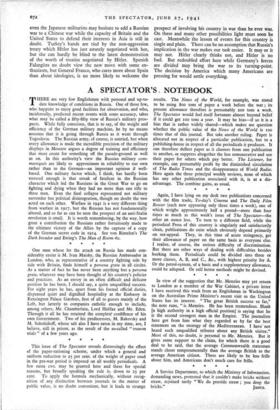A SPECTATOR'S . NOTEBOOK
THERE are very few Englishmen with personal and up-to- date knowledge of conditions in Russia. One of those few, who happens to enjoy good facilities for observation, and who, incidentally, predicted recent events with some accuracy, takes what may be called a fifty-fifty view of Russia's military pros- pects. While fully conscious, that is to say, of the weight and efficiency of the German military machine, he by no means assumes that it is going through Russia as it went through Yugoslavia. The Russian army, of course, is untried, but when every allowance is made the incredible precision of the military displays in Moscow argues a degree of training and efficiency that must count for something off the parade-ground as well as on. In this authority's view the Russian military com- muniqués are likely to approximate in reliability to our own rather than to the German—an important opinion if well- based. One military factor which, I think, has hardly been stressed enough is that streak of fatalism in the Russian character which led the Russians in the Great War to go on fighting and dying when they had no more than one rifle to three men. Even the final collapse represented not military surrender but political disintegration, though no doubt the two acted on each other. Warfare in 1941 is a very different thing from warfare in 1917, but the Russian has not fundamentally altered, and so far as can be seen the prospect of an anti-Stalin revolution is small. It is worth remembering, by the way, how great a contribution the Russians rather fortuitously made to the ultimate victory of the Allies by the capture of a copy of the German secret code in 1914. See von Rintelen's The Dark Invader and Ewing's The Man of Room 4o.






















 Previous page
Previous page